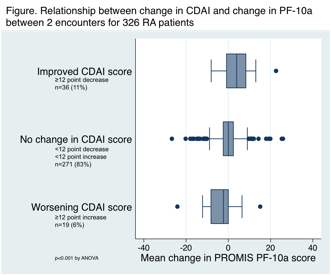Session Information
Session Type: ACR Poster Session C
Session Time: 9:00AM-11:00AM
Background/Purpose:
Rheumatoid arthritis (RA) patients’ physical function is a strong predictor of
clinical outcomes. A brief patient-reported measure of physical function, the
PROMIS PF-10a (PF-10a), is increasingly being used to measure physical function
in RA patients, but its sensitivity to changes in disease activity has not been
described in a real world clinical setting. In this study, we assess the
relationship between changes in a commonly used measure of disease activity,
the clinical disease activity index (CDAI), and changes in PF-10a.
Methods: Clinical
and demographic data were abstracted from the electronic health record for all
patients seen at a university-based rheumatology clinic between February 2013
and February 2015, who had at least two ICD-9 codes for RA. All patients had
PF-10a and CDAI scores documented on at least two occasions. We categorized
changes in CDAI score as improved, stable, or worse using Minimally Important
Difference (MID) criteria of a 12-point change in score, and compared changes
in PF10a scores across these three groups. We then evaluated sensitivity to
change by modeling the relationship between changes in disease activity (CDAI)
and changes in PF-10a over time with multilevel mixed effects linear
regression.
Results: Of
326 individuals included in the analysis, mean age (SD) was 59 (14), 83% were
women, 53% were Caucasian, and 48% had moderate or severe disease activity by
CDAI. Using MID criteria, CDAI scores were improved in 11% of encounters, were
stable in 83%, and worse in 6%. Among those whose disease activity improved,
PF-10a score improved by 4.4 ± 6.0 points
(mean ± SD). Among those with stable disease
activity, mean PF-10a score did not change (-0.1 ± 6.3 points), and among those with worsening disease activity, PF-10a
scores worsened by 3.6 ± 8.1 points (Figure). These
differences were significant (ANOVA p=0.0001). In a multivariate model
adjusting for starting CDAI, age, and gender, changes in CDAI score were associated
with changes in PF-10a scores (p<0.001).
Conclusion : The PROMIS-PF10a, a patient-reported measure of physical
function, appears sensitive to changes in RA disease activity as measured by
CDAI, suggesting it could play an important role in the clinical setting. Future
studies should evaluate discordance between measures of function and disease
activity by evaluating the role of disease duration, disability, and
comorbidities such as chronic pain or depression.
To cite this abstract in AMA style:
Wahl ER, Gross A, Chernitskiy V, Trupin L, Yazdany J, Katz PP. A Brief Patient-Reported Measure of Physical Function Is Sensitive to Changes in a Composite Disease Activity Measure in a Diverse Rheumatoid Arthritis Clinic Setting [abstract]. Arthritis Rheumatol. 2015; 67 (suppl 10). https://acrabstracts.org/abstract/a-brief-patient-reported-measure-of-physical-function-is-sensitive-to-changes-in-a-composite-disease-activity-measure-in-a-diverse-rheumatoid-arthritis-clinic-setting/. Accessed .« Back to 2015 ACR/ARHP Annual Meeting
ACR Meeting Abstracts - https://acrabstracts.org/abstract/a-brief-patient-reported-measure-of-physical-function-is-sensitive-to-changes-in-a-composite-disease-activity-measure-in-a-diverse-rheumatoid-arthritis-clinic-setting/

